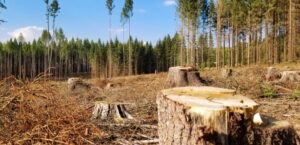Tag: climate change
Is Throwing Cans of Soup the Solution to Climate Change?
by Kaelin Ferland '23 on November 3, 2022
Opinion Staff
Opinion

The United Nations released a report just last week about how we are in dire need of climate action, explaining that “the world is still falling short of the Paris climate goals, with no credible pathway to 1.5 degrees C in place.” With these goals out of reach and no concrete plans to prevent our planet from warming an additional 1.5 degrees C, the UN warns that it seems as though immediate changes will be necessary to prevent climate catastrophe.
World leaders are not doing enough. The report adds that the COP26 Summit held last year did practically nothing to help mitigate climate change at the level that we need to. The UN explains that we will need to decrease greenhouse gas emissions by 45 percent in the next eight years. This number is unheard of, proving how desperately we need climate action and have waited too long. With a World Meteorological Organization report published the day before the UN’s statement that 2021 was a record-breaking year for greenhouse gas emissions, it seems as though climate change poses its greatest threat yet.
Even as individuals protest and scientists make constant warnings, politicians don’t listen. Recently, activists representing the Just Stop Oil organization have escalated their protests, for example, by throwing soup at Van Gogh’s Sunflowers and mashed potatoes at Les Meules by Monet. One activist even glued his head to Vermeer’s famous Girl with a Pearl Earring. None of the paintings were ruined in the process.
For many, these acts don’t make sense, and they are unsure of how these paintings connect to climate change and environmental issues. Others are worried about how these protests could cause environmentalists to be viewed in a negative light. However, some did support the Just Stop Oil protestors, pointing out how it’s frustrating that people are more angered about these actions than the lack of political action in the environmental sector.
It is confusing why the activists are targeting these paintings, specifically, given they have no relation to climate change; however, this isn’t the point of these demonstrations. The activists are trying to make a statement about how these paintings will be worthless if we continue to do nothing. In our society, it can feel like our traditional forms of protesting are not enough. Every September, Fridays for Future organizes a global climate strike involving hundreds of locations around the world and hundreds of thousands of protestors. In Germany alone, there were protests in 270 cities and approximately 280,000 people took to the streets. However, every year it seems as though these protests are overlooked and ignored by world leaders who continue to not take political action.
These protests haven’t caused nearly as much conversation about climate change as these activists have. While the Just Stop Oil demonstrations are over the top and seem to go too far, they have been effective in starting a massive conversation about climate change. However, as with most protests, this attention will be short-lived, and society will move on and forget. These efforts will ultimately be overlooked and climate action will be delayed, despite the scientists’ warnings and our demands for change.
Feeling Hopeless About Climate Change: Why We Need Climate Optimism
by Kaelin Ferland '23 on October 29, 2022
Opinion Staff
Editorials
When you look at climate change in the news, it is easy to feel hopeless and discouraged. It is impossible, especially recently, to open your phone without seeing headlines on social media about how the climate crisis has already begun to devastate communities around the world. From natural disasters like Hurricane Ian, which has been named the second deadliest hurricane to hit Florida since 1935, to the large-scale flooding in Pakistan that has left over 30 million people displaced, it can seem as though we are already too late.
It is easy to feel powerless in the fight against climate change, and when you keep seeing people with plastic water bottles in their backpacks while you try to carry your reusable one every day, you might feel like your actions are pointless. When you and only a handful of other students attend ECOPC meetings on a campus of over 4,000 students, it is just as easy to assume that you’re the only one that cares.
Climate optimism does not mean ignoring the news and the reality of climate change or not advocating for sustainability because everything is going to be okay. It is definitely not a form of denial, naivety, or ignorance. Rather, climate optimism requires us to do the opposite and be aware of what is going on. We need to acknowledge what humans have already done to mitigate climate change. It is a form of hope for our future.
There are many actions that have already been taken to help slow the effects of climate change, all of which should inspire climate optimism. The governor of New York recently announced that the state is going to ban gas-powered cars by 2035. This means that all new cars in the state will have to be zero-emissions vehicles. Other states including California, Massachusetts, and Washington have set similar goals. In other news, the founder of Patagonia has recently decided to give away his company and donate all profits to help fight climate change. Additionally, the Biden Administration announced plans to plant one billion trees in an effort to combat deforestation. At the end of September, researchers reported that because of conservation projects, grizzly bears, white-tailed eagles, and gray wolf populations in Europe saw a 44 percent, 445 percent, and 1800 percent increase, respectively.
As the generation that will be responsible for dealing with the climate crisis and its consequences, it can feel overwhelming, especially for young people. It can sometimes feel like the fate of the world is in our hands. While this is true, it does not have to be intimidating. We still have some time left to fix the problem, but having a constant doomsday mindset will not get us anywhere or help us come up with solutions. If we continue to be pessimistic about our future and claim that humans are too late to reverse what we’ve started, we cannot expect the problem to be solved. Optimism is what will ultimately inspire, change, and save our planet.
Remember this Summer’s Heatwave?: Here’s Why You Should Care
by The Cowl Editor on November 14, 2019
Opinion

the environment in several ways. Photo courtesy of Public Domain Pictures.
by Peter Mazzella ’22
News Staff
With record high heat waves this summer, there is only one group to blame: ourselves. Every year over 36 million trees are lost due to expansion and urbanization, and this could have some pretty serious side effects. If we continue to take our trees for granted “cities will become warmer, more polluted and generally more unhealthy for inhabitants,” said David Nowak, a senior US Forest Service scientist.
A continual loss of trees could mean an increase in temperature up to 10 degrees. This may not seem like too bad of a trade off, however, this seemingly small change could have drastic repurcussions on the environment and our future.
We could see a large decrease in universal water quality, and ice glaciers will likely melt, causing floods all over the world, which would be compounded by the fact that there would be less trees to absorb the flood water.
It may not seem like we are losing enough trees to make a noticeable difference, however, the lost value of the trees being cut down per year are around $96 million. So what? When a set of trees are cut down to build a new road or building, it not only affects the new site, but also the surrounding region.
Trees are also helpful in the absorption of greenhouse gases that can potentially be harmful in our lifetime. With only half of trees remaining, this danger becomes more and more of a concern.
15.3 billion trees are estimated to be cut down every year, and the numbers are increasing as deforestation continues to be a large problem. The earth has about 3.04 trillion trees, although that number is vastly declining each year.
Although it would take a considerable amount of time for every tree to be cut down, far longer than our perceived lifespans, it does not mean we should not be active about conserving our trees.
If trees were cut down to a level where they become scarce, this would have overwhelming effects on the state of the earth. Land would dry out, which would cause forest fires and damage the remaining animal populations in those areas.
The numbers may seem grim, but that does not mean that we should stand idly by as our forests become obsolete. A small island off the coast of Tanzania called Kokota is combating climate change and taking matters into their own hands. In the past decade, this small island has planted over two million trees to repair the damages done to their land. There are ways that we all can help to sustain our forests and keep the air clean.
Organizations like One Tree Planted and The Nature Conservancy take donations to plant trees to replenish the forests lost due to wildfires and deforestation. One Tree Planted is hosting a fundraiser for the recent wildfires in California, where a $1 donation will plant one tree. The Nature Conservancy has a goal of planting one billion trees, through donations and hands-on work.
If we want to sustain our clean air and protect our forests, the first step is demanding action. By contributing to nonprofit organizations with the intention of restoring forests, the impact of one donation could be immense. Multiply that by a population, and the results could be life changing for generations to come. Informing the general public is the first step to change. One tree could be a catalyst for many others to come, which can alleviate some of the stress that we have put on the earth in recent years.
